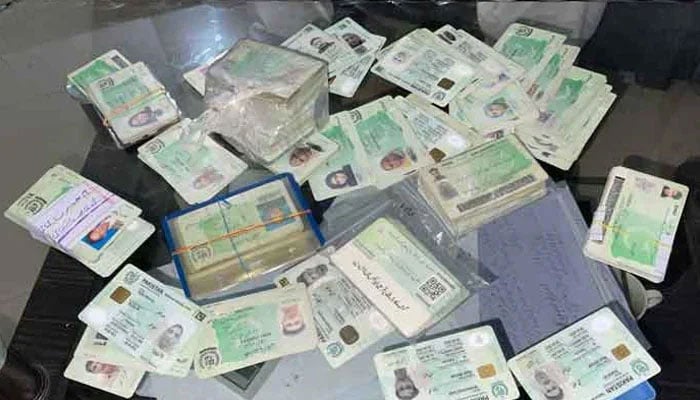Declaring CNIC as Pakistan’s unified medical record number a historic decision: HealthRAB
The decision to declare the Computerised National Identity Card (CNIC) number as each citizen’s Medical Record (MR) number has been hailed as a historic milestone by the health fraternity, medical associations, and research organisations — most notably the Health Research Advisory Board (HealthRAB).
Terming it a transformative step towards data-driven health governance in Pakistan, renowned diabetologist and Chairman of HealthRAB, Prof Abdul Basit, lauded Federal Health Minister Mustafa Kamal and Chairman NADRA, Lt Gen Muhammad Munir Afsar, for what he called a “visionary and game-changing move” for the country's healthcare system.
“By using the CNIC as a universal MR number, Pakistan is finally making the leap towards integrated, patient-centric care,” he said. “This step will not only help in identifying undiagnosed patients — especially those suffering from silent diseases like diabetes and hypertension — but will also enable evidence-based policymaking for public health.”
Prof Basit emphasised the value of such integration for medical research and disease surveillance. “The use of CNIC as a universal MR number will greatly support the development and maintenance of national disease registries,” he added.
“For the first time, we will be able to build real-time databases for chronic and lifestyle-related conditions, which are essential for effective prevention, control, and resource allocation.”
He further noted that linking health data to the National Database and Registration Authority’s (Nadra) Nadra vast and secure infrastructure would allow for better tracking of disease trends and help shift the burden away from tertiary hospitals by strengthening preventive and primary care systems.
Announced by Minister Mustafa Kamal during a high-level meeting with Nadra officials in Islamabad, the initiative forms a central component of the government's “One Patient, One ID” policy. The rollout would ensure that every Pakistani's medical record was securely stored and accessible from any part of the country, enabling continuity of care and reducing redundancy in diagnostics and treatment.
Prof Basit also welcomed the government's plans to expand telemedicine and deploy mobile health units as part of the broader digital health strategy. “This is not just a technological upgrade—it’s a people-first approach. It will particularly benefit patients in rural and underserved areas who are often excluded from formal healthcare systems,” he noted. He expressed optimism that this digital health vision would pave the way for innovations such as biometric access to patient records, targeted interventions for non-communicable diseases, and the establishment of national health registries.
-
 Hailey Bieber's Subtle Gesture For Eric Dane’s Family Revealed
Hailey Bieber's Subtle Gesture For Eric Dane’s Family Revealed -
 Moment Prince William 'broke Down' And 'apologised' To Kate Middleton
Moment Prince William 'broke Down' And 'apologised' To Kate Middleton -
 Paul Mescal And Gracie Abrams Stun Fans, Making Their Romance Public At 2026 BAFTA
Paul Mescal And Gracie Abrams Stun Fans, Making Their Romance Public At 2026 BAFTA -
 EU Rejects Any Rise In US Tariffs After Court Ruling, Says ‘a Deal Is A Deal’
EU Rejects Any Rise In US Tariffs After Court Ruling, Says ‘a Deal Is A Deal’ -
 King Charles Congratulates Team GB Over Winter Olympics Success
King Charles Congratulates Team GB Over Winter Olympics Success -
 Meryl Streep Comeback In 'Mamma Mia 3' On The Cards? Studio Head Shares Promising Update
Meryl Streep Comeback In 'Mamma Mia 3' On The Cards? Studio Head Shares Promising Update -
 Woman Allegedly Used ChatGPT To Plan Murders Of Two Men, Police Say
Woman Allegedly Used ChatGPT To Plan Murders Of Two Men, Police Say -
 UK Seeks ‘best Possible Deal’ With US As Tariff Threat Looms
UK Seeks ‘best Possible Deal’ With US As Tariff Threat Looms -
 Andrew Arrest Fallout: Princess Beatrice, Eugenie Face Demands Over Dropping Royal Titles
Andrew Arrest Fallout: Princess Beatrice, Eugenie Face Demands Over Dropping Royal Titles -
 Rebecca Gayheart Breaks Silence After Eric Dane's Death
Rebecca Gayheart Breaks Silence After Eric Dane's Death -
 Kate Middleton 2026 BAFTA Dress Honours Queen Elizabeth Priceless Diamonds
Kate Middleton 2026 BAFTA Dress Honours Queen Elizabeth Priceless Diamonds -
 Sterling K. Brown's Wife Ryan Michelle Bathe Reveals Initial Hesitation Before Taking On New Role
Sterling K. Brown's Wife Ryan Michelle Bathe Reveals Initial Hesitation Before Taking On New Role -
 BAFTA Film Awards Winners: Complete List Of Winners
BAFTA Film Awards Winners: Complete List Of Winners -
 Millie Bobby Brown On Her Desire To Have A Big Brood With Husband Jake Bongiovi
Millie Bobby Brown On Her Desire To Have A Big Brood With Husband Jake Bongiovi -
 Backstreet Boys Admit Aging Changed Everything Before Shows
Backstreet Boys Admit Aging Changed Everything Before Shows -
 Biographer Exposes Aftermath Of Meghan Markle’s Emotional Breakdown
Biographer Exposes Aftermath Of Meghan Markle’s Emotional Breakdown




